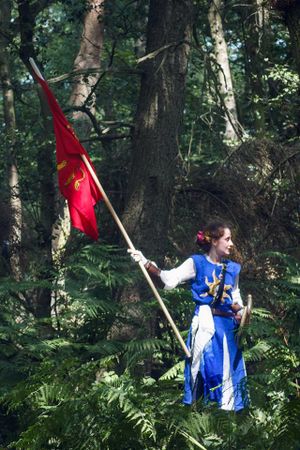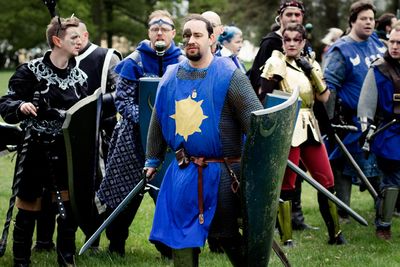Knightly order
No edit summary |
|||
| Line 11: | Line 11: | ||
All that is required to form a knightly order is for a group of knights to come together and declare themselves as such, ideally with a chapterhouse, fortress, or manor to serve as their base of operations. Traditionally, the prestige of a knightly order waxes and wanes based entirely on the renown of its members; another reason for the knights to strive to attain ever more glorious achievements. | All that is required to form a knightly order is for a group of knights to come together and declare themselves as such, ideally with a chapterhouse, fortress, or manor to serve as their base of operations. Traditionally, the prestige of a knightly order waxes and wanes based entirely on the renown of its members; another reason for the knights to strive to attain ever more glorious achievements. | ||
Unsurprisingly, the core of any knightly order is a group of knights. A knightly order made up entirely of [[questing knight|questing knights]] for example is very different to one composed of [[knight-errant|knights-errant]]. Some knightly orders combine | Unsurprisingly, the core of any knightly order is a group of knights. A knightly order made up entirely of [[questing knight|questing knights]] for example is very different to one composed of [[knight-errant|knights-errant]]. Some knightly orders combine nobles with knights-errant, often with the questing knights serving as mentors and guides to the ambitious knights-errant; such orders are sometimes called ''aspirant orders''. In a few cases, a knightly order will be made up of [[Dawn_magical_traditions#War_witches|war witches]] - using their magic, rather than force of arms, to pursue glory. | ||
Almost all knightly orders have an oath that the members swear when they join that announces the particular approach to glory they share. The oath is usually public knowledge, helping to define the nature of the order in the eyes of the rest of Dawn. | Almost all knightly orders have an oath that the members swear when they join that announces the particular approach to glory they share. The oath is usually public knowledge, helping to define the nature of the order in the eyes of the rest of Dawn. | ||
Latest revision as of 19:32, 28 March 2024
Overview
Knights are found throughout Dawnish society, both as a part of noble houses and as members of knightly orders. These groups are so dedicated to the pursuit of glory that they separate themselves from the politics of the earls and the noble houses. If a noble house is thought of as a "family", then a knightly order is closer to a private club. The members band together, committed to a common approach and united by a shared vision, to risk their lives in pursuit of glory.
Some orders demand complex rules of behaviour from their members, or have a spiritual element - they strive to uphold one or more of the virtues, or swear to pursue and protect true love. Many dedicate themselves to a grand quest, such as conquering a new territory for Dawn or destroying a hated eternal. They are usually open about these ambitions - not only do they attract like minded knights to seek membership but by publicly working toward their goals they accrue additional glory.
As with the noble houses, members of a knightly order use unique heraldry to identify their affiliation. Most often the order's heraldry is less important to the knight than their personal heraldry; it is often worn as a badge or on a medallion rather than on the shield or surcote.
Formation
All that is required to form a knightly order is for a group of knights to come together and declare themselves as such, ideally with a chapterhouse, fortress, or manor to serve as their base of operations. Traditionally, the prestige of a knightly order waxes and wanes based entirely on the renown of its members; another reason for the knights to strive to attain ever more glorious achievements.
Unsurprisingly, the core of any knightly order is a group of knights. A knightly order made up entirely of questing knights for example is very different to one composed of knights-errant. Some knightly orders combine nobles with knights-errant, often with the questing knights serving as mentors and guides to the ambitious knights-errant; such orders are sometimes called aspirant orders. In a few cases, a knightly order will be made up of war witches - using their magic, rather than force of arms, to pursue glory.
Almost all knightly orders have an oath that the members swear when they join that announces the particular approach to glory they share. The oath is usually public knowledge, helping to define the nature of the order in the eyes of the rest of Dawn.
Choosing a leader
One thing that sets a knightly order apart from a noble house is that they are not lead by an earl, which means the order has no ability to organise tests. Almost all knightly orders pride themselves on this distinction. They still tend to have a leader however, whose main role is to determine who can or cannot join the knightly order. While some orders practice a blackball system, even they will tend to have a recognised leader who represents the order in day-to-day affairs.
There's no standard title for the leader of a knightly order, nor any standard way for them to be chosen. The most common title is knight-marshal but it is considered to have a slightly archaic ring to it. Some orders hold a contest to select their leader, often a tourney or a battle of magic, but contests of skill or even learning are not unknown. A few have complex rules about determining how the knight-marshal may be challenged and replaced but others embrace their leader until they die - ideally while engaged in some gloriously unfeasible endeavour.
Creating a Knightly Order
Most of the members of your knightly order will be knights of one type or another - archetypes such as questing knight, knight-errant, and war witch are the most common. As with any group archetype, however, there are roles for many different type of character. Most knightly orders aspire to have a troubadour among their number - someone who can provide spiritual advice and support but most importantly record the glorious deeds the knights undertake, and spread their legend across Dawn and the rest of the Empire.
Any Dawnish group is likely to include roles for yeofolk. Men-at-arms and squires commonly support the knights, whether they are nobles or yeofolk themselves. Because Dawnish nobles are largely disinterested in money, even an order of knights-errant are likely to have a seneschal or retainer whose job is to keep the knights fed and provide for their needs and avoid them having to waste time with such squalid endeavours.
Forming a Knightly Order in Play
You can form a knightly order in play at any time. The best way is to create a new knightly order - to lay down some guiding quest or glorious objective that your order will be committed to and to commit yourself utterly to that goal. Knightly orders are usually short-lived - the best of them burn brightly, they don't fade away. By creating something new, you can make establishing and promoting your knightly order a character goal that everyone in the order can strive towards. Make sure you don't pick something too easy for your goals, so that pursuing it becomes a thing of legend that takes years rather than being over too quickly.
Despite the generally short-lived nature of a knightly order, you do have the option to create one that has been existed for some time. You'll still need to think about the goal and approach that your order will be pushing for, but you'll also need to give some thought as to why it has been around for so long without achieving glorious success or glorious failure.
In either case if you choose a home for your order, you're free to make up some simple details for this. One of the nobles in your order might own a small castle, or maybe your order is based out of a manor house, a chapel or even a tavern somewhere! Your home is usually less important for questing knights, since your focus should be to achieve your goals as gloriously as possible, rather than thinking about lands or temporal power.

